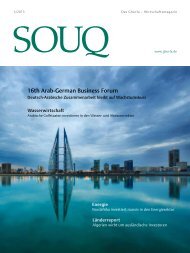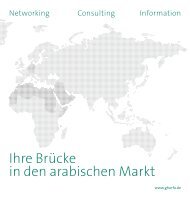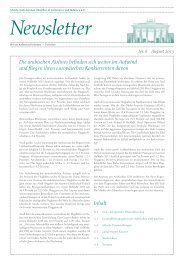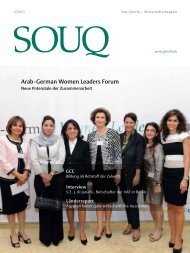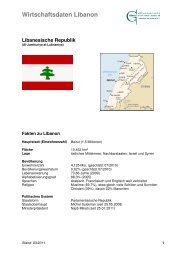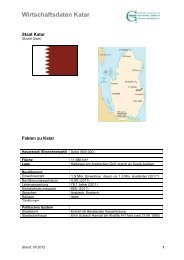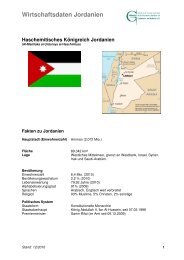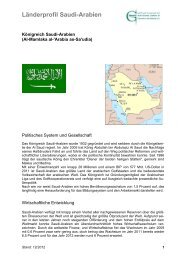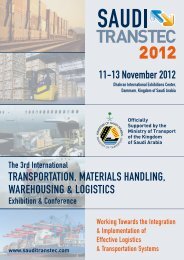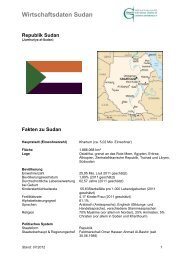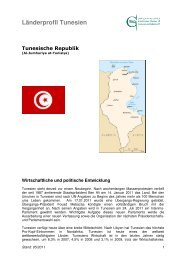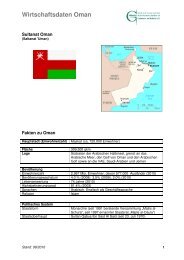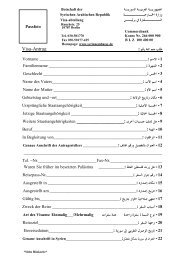Saudi-Arabien Wirtschaftshandbuch Saudi Arabia Business ... - Ghorfa
Saudi-Arabien Wirtschaftshandbuch Saudi Arabia Business ... - Ghorfa
Saudi-Arabien Wirtschaftshandbuch Saudi Arabia Business ... - Ghorfa
Erfolgreiche ePaper selbst erstellen
Machen Sie aus Ihren PDF Publikationen ein blätterbares Flipbook mit unserer einzigartigen Google optimierten e-Paper Software.
110<br />
former state-controlled sectors are currently undergoing<br />
deregulation. The private commercial development<br />
of the production and sale of electricity is now possible<br />
and has already been accomplished on a low scale in combination<br />
with water desalination plants. In the telecommunications<br />
field, shares of the <strong>Saudi</strong> Telecom have been<br />
available for purchase on the <strong>Saudi</strong> stock exchange since<br />
the start of 2003 and are highly popular among <strong>Saudi</strong><br />
private persons and investors.<br />
A second private commercial license for GSM was issued<br />
to the Etisalat that comes from the United Arab Emirates,<br />
which had founded a public limited company in <strong>Saudi</strong><br />
<strong>Arabia</strong> for this purpose. The insurance sector was removed<br />
from the negative list in 2004. This was closely tied<br />
to the statutory regulations relating to the control of the<br />
insurance sector governed by the Cooperative Insurance<br />
Companies Control Law and its implementation regulations,<br />
which came into effect in 2003 and May 2004.<br />
The sales concepts of the contract dealer, i.e. wholesale<br />
and retail, were finally struck off the negative list in March<br />
2007. This was undertaken during the scope of commitments<br />
that <strong>Saudi</strong> <strong>Arabia</strong> had entered into on becoming a<br />
member of the WTO in December 2005. It remains to be<br />
seen whether or not decisive changes will be completely<br />
realised and a minimum domestic interest as stated in the<br />
WTO declaration of commitment is realised. In the negotiations<br />
prior to its entry to the WTO, <strong>Saudi</strong> <strong>Arabia</strong><br />
committed itself to opening up the commercial agency<br />
and/ or wholesale sector gradually from a foreign capital<br />
investment level of 51% to up to 75% within 3 years<br />
of entering the WTO. However this would mean that the<br />
foreign investor would need to invest at least 20 million<br />
SR (approx. 3.6 million Euro).<br />
The SAGIA located in Riyadh is the central authority<br />
for licensing foreign investment projects in <strong>Saudi</strong> <strong>Arabia</strong>.<br />
Also, SAGIA is responsible for promoting investment in<br />
<strong>Saudi</strong> <strong>Arabia</strong>. As an incentive for this, it offers the foreign<br />
investor its services as a “one-stop shop”. The foreign investor<br />
thus also has access to employees of other relevant<br />
authorities, such as e.g. the customs authorities, the labour<br />
office, the immigration office, the Ministry of Trade<br />
etc. all under SAGIA’s roof. SAGIA has set up so-called<br />
investor service centres in Riyadh, Jeddah, Dammam and<br />
Medina. For more information about SAGIA, please visit<br />
the website www.sagia.gov.sa.<br />
SAGIA must provide notification about a licence application<br />
within 30 days after its date of receipt has been<br />
documented by the authority. If the application is re-<br />
jected, reasons need to be provided. If no notification is<br />
given, the licence application is seen as approved. In all<br />
cases, i.e. even if the application is approved, registration<br />
with the Ministry of Trade and Industry is also necessary<br />
to ensure entry into the commercial register. The project<br />
only exists legally after it has been registered here.<br />
the investment capital<br />
The investment law differentiates between industrial, agricultural,<br />
service and other projects. Originally there used<br />
to be statutory minimum capital requirements that were<br />
defined in Art. 5 No. 3 of the implementation regulations<br />
of the investment law, however these have now been lifted<br />
and there is no longer any prescribed minimum capital<br />
requirements. In the past, the minimum capital for agricultural<br />
projects was 25 million SR, for industrial projects<br />
5 million SR and for service and other projects 2 million<br />
SR. However in practice, the <strong>Saudi</strong> authorities still differentiate<br />
between project types and specify the minimum<br />
investment capital according to project type as follows:<br />
– Service licence 500,000 SR for companies,<br />
100 SR for individual investors<br />
– Industry licence 1 million SR<br />
– Trading licence 20 million SR<br />
– Agricultural licence 25 million SR<br />
– Real estate licence 30 million SR<br />
Also, the investment capital is based on the respective size<br />
of the project.<br />
Furthermore there may also be minimum capital requirements<br />
as a result of other mandatory statutory regulations.<br />
For example, the minimum registered capital of a<br />
<strong>Saudi</strong> limited company with a foreign capital interest is<br />
500,000 SR. This corresponds to the registered capital<br />
for limited companies that was stipulated by law in the<br />
<strong>Saudi</strong> Companies Law up until July 2007. This was then<br />
replaced with the ruling that the partners of the limited<br />
company could define the amount of registered capital in<br />
the company articles. However this ruling only applies to<br />
limited companies that do not have any foreign capital.<br />
This ruling serves to make the limited company as a legal<br />
form more attractive.<br />
the foreign capital ratio<br />
The investment law specifically states that foreign companies<br />
are allowed to invest in a project that is completely<br />
owned by foreign capital. Also, it is possible to found joint<br />
companies with <strong>Saudi</strong> partners. Accordingly, both com-



